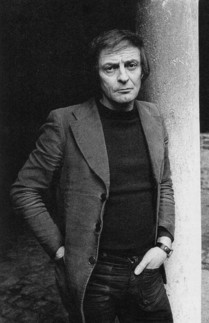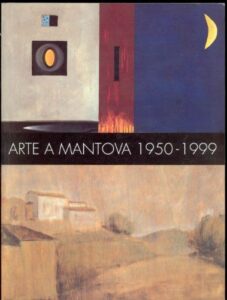
Alceo Poltronieri: an autobiography
My name is Alceo. I was born in Mantua the 22nd September 1924 because of my father and my mother.
I have used my hands to say that they are useless, they neither keep our despair away nor allow us to pray.
I made the clouds because I like them.
I was in the tradition of classical perspective and it limited me.
I wanted to leave the picture and enter the picture freely, something that the classical perspective did not allow me to do.
And I searched, searched until I found a new system.
Now, between the classical perspective and my new perspective, the difference is evident: it will be enough to compare one of my traditional paintings with recent ones.
The law and principle that govern my new perspective consists in the fact that I took the base of the frame as the horizon line.
In this way, worthy figures can enter or leave the picture at will.
In addition to the theory of the new horizon, I enjoy using gold and silver now.
Partisan fighter in his youth, painter, graphic designer, musician, writer, Poltronieri is an example of multifaceted genius.
Alceo Poltronieri was born in Bagnolo San Vito (MN) the 22nd September 1924. He worked as a baker in his father's shop and, at a very young age, actively participated in the Resistance.
After the tragic death of his sisters, Maria and Bianca, he married in 1950 and embarked on a long career in the world of small industry.
Since those years Alceo started painting, composing poetry and music, but it was only at the beginning of the Seventies that he devoted himself exclusively to these activities.
Towards the end of the Eighties he left the city and returned to the countryside, where he was born.
Here, he decides to die in August 1995.
Having experimented with the collage technique when he was still signing "Mario Ross", after his forays into the abstract in the 1960s, Poltronieri was then classified as "naive" for the choice of a spontaneity of painting that leads him to structure the painting in a simplified, apparently instinctive, and to use figurative modules that become repeated and recognizable stylistic code (angels, clouds, young curly women, animals of a fabulous bestiary).
But Poltronieri has nothing naive, he is instead a lucid intellectual, as Renzo Margonari also emphasized, correcting the misunderstanding of the artist's "naïvetè".
The placement among the "naive" Masters, which also determined the wide diffusion of his painting, must therefore be rethought in favor of the fantastic value of the dream drift in a space that is never physical or historical, that the shots - whether of a painted frame, of classical architecture - they move away into the indefinite and ubiquitous of dreams.And you always feel - even in the rutilance of color, when it is not instead a duller palette and as if drained by distance elsewhere - an emerging feeling of anguish.
So that the flights, the overturning of perspective, the reversal of the cardinal points, the incongruous combinations of objects, people and animals (domestic when they are recognizable, but always alienated), the skies and the clouds, the same "metaphysical" interiors of the house , the ironic notations seem to say the impossibility of accepting the normed daily life, the order of common sense: they deny the presumed happiness of living, they rather affirm the painful desire to be disoriented, to configure other spaces in which to challenge the given reality, of constructing a fiction whose awareness, moreover, excludes pacifying solutions: painting as therapy, one could say, moments of deep breath.The safety of the sign, the modernity of the anti-naturalistic use of color, the pictorial and drawing qualities of Alceo Poltronieri testify to the awareness of his painting.
He died in Bagnolo San Vito (Mantua) in 1995.There have been numerous solo exhibitions as well as group shows from the 1970s to the 1990s, up to the posthumous 1998 exhibitions at the National Museum of Naïves Arts in Luzzara, the Legno-linea exhibition space and the Arianna Sartori Gallery in Mantua ”.
Renata Casarin, from "Art in Mantua 1950-1999", Publi Paolini (2000)
Poltronieri has extraordinary abilities as a colourist. The adoption of acrylics allows him to have very refined glazes; his images seem to be covered with an impalpable talcum powder, as if they had been abandoned for years in the dry dust of a closet.

Renzo Margonari
The keywords of Poltronieri's work are playfulness and drama. Everything revolves around these two concepts. He also had a strong taste of color that he transferred in an intense and expressive way.

Giovanni Pasetti
Poltronieri's painting becomes the congenital gestures of an organism that plays on an oscillation of supposedly anomalous mental states, but in reality well codified, researched, desired.

Ercole Fava
Instant mirrors of his soul, his paintings are his limpid breath of life, they are his candid, universal breath.
Alberto Hannüss
The "state of nature" is a strong theme of the artist. Alceo Poltronieri's figures move in a space out of time, almost always symbolic, but, above all, free.

Paola Cortese
His free spirit, while tormented by the fervor of human and not only pictorial research, has left that mark that is identified in spontaneous art.


